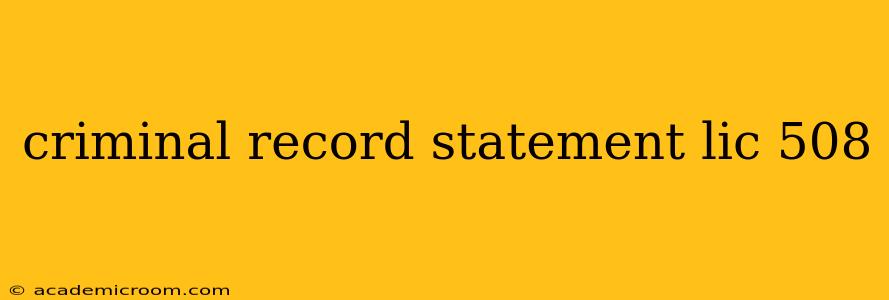California's Licensing and Certification program, specifically section 508, often requires applicants to submit a statement regarding their criminal history. This process can be confusing, so this guide aims to clarify the requirements and address common questions. Navigating this process correctly is crucial for anyone seeking licensure in California.
What is LIC 508?
LIC 508 isn't a standalone law or regulation but refers to the general requirement within various California licensing boards to disclose criminal history. Each licensing board has its own specific processes and criteria for evaluating criminal records. While the specifics vary depending on the profession, the underlying principle remains the same: transparency and assessment of an applicant's fitness to practice. The section number might vary slightly depending on the specific board's regulations.
What information is required in a criminal record statement for LIC 508?
The information required typically includes:
- Full legal name: Including any previous names used.
- Date of birth: Accurate and complete.
- Social Security number: Usually needed for background checks.
- Complete details of all arrests and convictions: This includes the date, location, charges, and disposition of each case. Even dismissed charges or cases that were sealed or expunged may need to be reported. It’s better to err on the side of complete disclosure.
- Information about any pending cases: This is crucial for transparency.
The specific format for submitting this information will be outlined in the application instructions provided by the relevant licensing board.
How do I obtain my criminal record?
You can obtain a copy of your criminal record through various channels:
- California Department of Justice (DOJ): The DOJ provides fingerprinting services and access to your criminal history information.
- Federal Bureau of Investigation (FBI): For a more comprehensive background check, including records from other states, you may need to contact the FBI.
- Local law enforcement agencies: Depending on the location of the offense, you might be able to obtain a record from the local police department or sheriff's office.
Remember, obtaining these records may involve fees.
What happens after I submit my criminal record statement?
After you submit your statement, the licensing board will review your information. This review process may involve a background check and may take some time. The board will determine whether your criminal history warrants further investigation or poses a barrier to licensure.
Are all criminal convictions disqualifying?
No, not all criminal convictions automatically disqualify an applicant. Licensing boards evaluate each case on its merits, considering factors such as:
- The nature of the offense: Some crimes are considered more serious than others and may carry a higher risk of disqualification.
- The age of the offense: Older offenses may be viewed less severely.
- Evidence of rehabilitation: Demonstrating a commitment to rehabilitation after conviction can significantly improve your chances.
- The specific requirements of the profession: Certain professions have stricter standards than others.
What if I have a sealed or expunged record?
Even if your record is sealed or expunged, you may still be required to disclose it in your application. Failure to disclose such information can have serious consequences. Consult with legal counsel if you have questions about disclosing a sealed or expunged record.
Can I appeal a denial of licensure based on my criminal record?
Yes, in most cases, you have the right to appeal a denial of licensure. The appeal process will vary depending on the licensing board and its regulations. It’s advisable to seek legal counsel to navigate this process effectively.
This information is for guidance only and does not constitute legal advice. It is imperative to consult the specific requirements of the relevant California licensing board and seek legal counsel if necessary. The information provided here is based on general understanding and may not encompass every possible scenario. Always consult official sources for the most up-to-date and accurate information.
